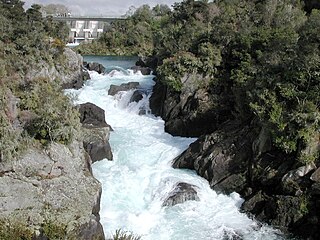
The Department of Conservation is the public service department of New Zealand charged with the conservation of New Zealand's natural and historical heritage.

Margaret Anne Wilson is a New Zealand lawyer, academic and former Labour Party politician. She served as Attorney-General from 1999 to 2005 and Speaker of the House of Representatives from 2005 to 2008, during the Fifth Labour Government.

The Hen and Chicken Islands, usually known as the Hen and Chickens, lie to the east of the North Auckland Peninsula off the coast of northern New Zealand. They lie 12 kilometres (7.5 mi) east of Bream Head and 40 kilometres (25 mi) south-east of Whangārei with a total area of 8.44 km2 (3.26 sq mi).

Miriam Bridelia Soljak was a pioneering New Zealand feminist, communist, unemployed rights activist and supporter of family planning efforts. Born in Thames, New Zealand, she was raised as a Catholic and studied to be a teacher. From 1898 to 1912, she taught in native schools, learning about Māori culture and becoming fluent in the language. In 1908, she married Peter Soljak, an immigrant from Dalmatia, now part of Croatia, but at the time part of the Austrian Empire. In 1919, because of war legislation, she was denaturalised and forced to register as an enemy alien, because of her marriage. Despite their divorce in 1939, Soljak was unable to recover her British nationality.

William Hosking Oliver, commonly known as W. H. Oliver but also known as Bill Oliver, was a New Zealand historian and poet. From 1983, Oliver led the development of the Dictionary of New Zealand Biography.

Dame Claudia Josepha Orange is a New Zealand historian best known for her 1987 book The Treaty of Waitangi, which won 'Book of the Year' at the Goodman Fielder Wattie Book Award in 1988.

Brigadier Duncan MacIntyre was a New Zealand politician of the National Party. He served as the eighth deputy prime minister of New Zealand from 1981 to 1984 under Prime Minister Robert Muldoon.

Aratiatia Power Station is a hydroelectric power station on the Waikato River, in the North Island of New Zealand. It is the first hydroelectric power station on the Waikato River, and is located 13 kilometres (8.1 mi) downstream of Lake Taupō. Aratiatia is owned and operated by Mercury Energy.
Bullendale is an abandoned mining settlement in Otago, New Zealand. It is the site of New Zealand's first industrial hydro-electric power plant. Located in rugged and remote countryside, it has survived to become of historical significance, and several archaeological surveys have been conducted there.
Elizabeth Grace Neill was a nurse from New Zealand who lobbied for passage of laws requiring training and national registration of nurses and midwives; in 1901, New Zealand was the first country in the world to introduce such laws. The nursing experience she received during her early life inspired her to reform many aspects of the nursing practice, and her experience as a factory inspector led her to instigate other social reforms.
Sarah Elizabeth Jackson was a New Zealand teacher, industrial school matron and manager, community leader.

Christina Kirk Henderson was a New Zealand teacher, feminist, prohibitionist, social reformer and editor.
Robina Thomson Cameron, known as Ruby Cameron, was a New Zealand district nurse, community leader and nursing inspector. She was born in Edinburgh, Midlothian, Scotland, on 15 April 1892, coming to New Zealand in 1911 where she trained at Cook Hospital, Gisborne.
Jessie Bicknell was a New Zealand civilian and military nurse, and a health administrator. She served in World War I and was made an Associate of the Royal Red Cross for her service.
Cats are a popular pet in New Zealand. Cat ownership is occasionally raised as a controversial conservation issue due to the predation of endangered species, such as birds and lizards, by feral cats.
Alan Dudley Ward was a New Zealand historian, particularly known for his research into customary land tenure by Māori in New Zealand.
Anne Else is a New Zealand writer, researcher and editor.
Sisters Overseas Service (SOS) was a New Zealand organisation that helped women travel to Australia to obtain abortions in the 1970s and early 1980s. It was founded in response to the restrictions imposed by the Contraception, Sterlisation, and Abortion Act 1977. SOS arranged for women from all parts of New Zealand to travel to Australian abortion clinics as well as helping to fund women's travel. By 1979 the law was interpreted more liberally reducing the need for the services of SOS.

Elizabeth Sewell (1940–1988) was a New Zealand activist in the feminist movement in the 1970s and 1980s. She was the first head of the Ministry for Consumer Affairs.
Alison Mary Gray was a New Zealand writer and social researcher. She wrote 11 books, ranging from feminist oral histories to novels and children's books. Gray established a social policy research consultancy that contributed to public sector policy reports in New Zealand and other Pacific nations.










